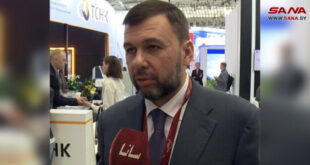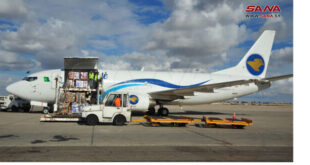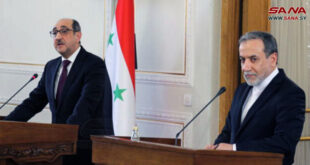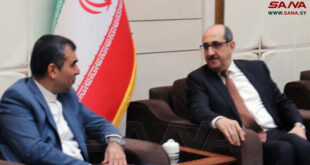Damascus, SANA- Undeterred by all challenges and difficulties imposed by the terrorist war waged against Syria, the health sector in the country has proven its efficiency as no epidemics have been registered and it has been able to curb the poliomyelitis cases which appeared in the years 2013 and 2017 and by the end of the last year Syria was declared free of polio.
The healthcare services in Syria cover most of the individual’s lifelong health needs and they provide the prophylaxis and treatment services and palliative care and the quality of these services is considered as a valuable investment that limits the total costs of the healthcare.
Due to the importance of the primary healthcare, the World Health Organization selected it as a topic to be discussed on the World Health Day on April 7th for the current year under the slogan ” Primary Healthcare… Way Towards Comprehensive Health Coverage,” with the aim of making the efforts exerted by health institutions and organizations in Syria focus on those services and allowing them to reach different areas.
Primary healthcare services include reproductive health programs for women during pregnancy and childbirth, child and neonatal care, national immunization campaigns, follow-up of child health through school, as well as health programs for adolescents and older persons, according to the Director of Primary Healthcare Department at the Ministry of Health, Dr. Fadi al-Qassis.
During the years of the terrorist war on Syria, psychological healthcare services were added to the primary healthcare services, al-Qassis noted.
As a result of the terrorist war on Syria, many hospitals and health centers went out of service. Therefore, the Ministry of Health has worked on rehabilitating hospitals and health centers once stability restored to any area, al-Qassis said.
He added that 17 hospitals and 190 health centers which provide different types of healthcare have been rehabilitated , in addition to rehabilitating the emergency system by 80 percent as well as training and qualifying human cadres and covering any shortage in order to ensure providing primary healthcare in an appropriate manner in different areas across the country.
Dr. al-Qassis pointed out that the system of referral from health centers to specialized hospitals was one of the good health systems in Syria, but it was stopped due to war conditions, and recently a study has been completed to reactivate it in a number of areas .
During the year 2019, many health surveys have been conducted by the Primary Healthcare Department as those surveys will provide indicators for setting health plans for several years.
Al-Qassis said that a survey has been completed to determine the causes of child mortality under five years and a nutritional survey for pregnant women will be started.
A urinary iodine laboratory was established at the Directorate of Primary Healthcare Control, according to Qassis who added that next September, a survey will be conducted on 5,000 school children to ensure rapid intervention to protect children from iodine deficiency.
Representative of World Health Organization (WHO) in Damascus Elizabeth Hoff, for her part, said that the primary healthcare services are the cornerstone of health services delivery through obtaining a package of services aimed at enhancing the health of the individual, regardless of his material status.
Hoff affirmed that the pre-war health care programs in Syria were among the strongest programs at the regional level.
She pointed out that work is underway to develop plans in cooperation with the bodies concerned in Syria to speed up the recovery of the health sector in Syria, noting that the Ministry of Health in Syria through health institutions pay special attention to providing healthcare services to different areas.
The WHO organization has worked in Syria in cooperation with the Ministry of Health to support the reintroduction of health referral system and the inclusion of psychological health in the primary healthcare programs, in addition to rehabilitating a number of health centers and providing the emergency system at the ministry and the Syrian Arab Red Crescent (SARC) with more ambulances according to available capabilities.
Hoff added that the WHO has carried out other programs which contribute to the access of health services to various areas, considering that the national vaccination program is one of the programs of health interventions which has an economic feasibility for achieving a comprehensive health coverage.
It is noteworthy that the primary healthcare programs in Syria began in 1988, and they have covered many spheres, including childcare, motherhood, vaccination and family planning, as well as the environmental sanitation, communicable diseases control, oral and dental health and health education.
Ruaa al-Jazaeri
 Syrian Arab News Agency S A N A
Syrian Arab News Agency S A N A




